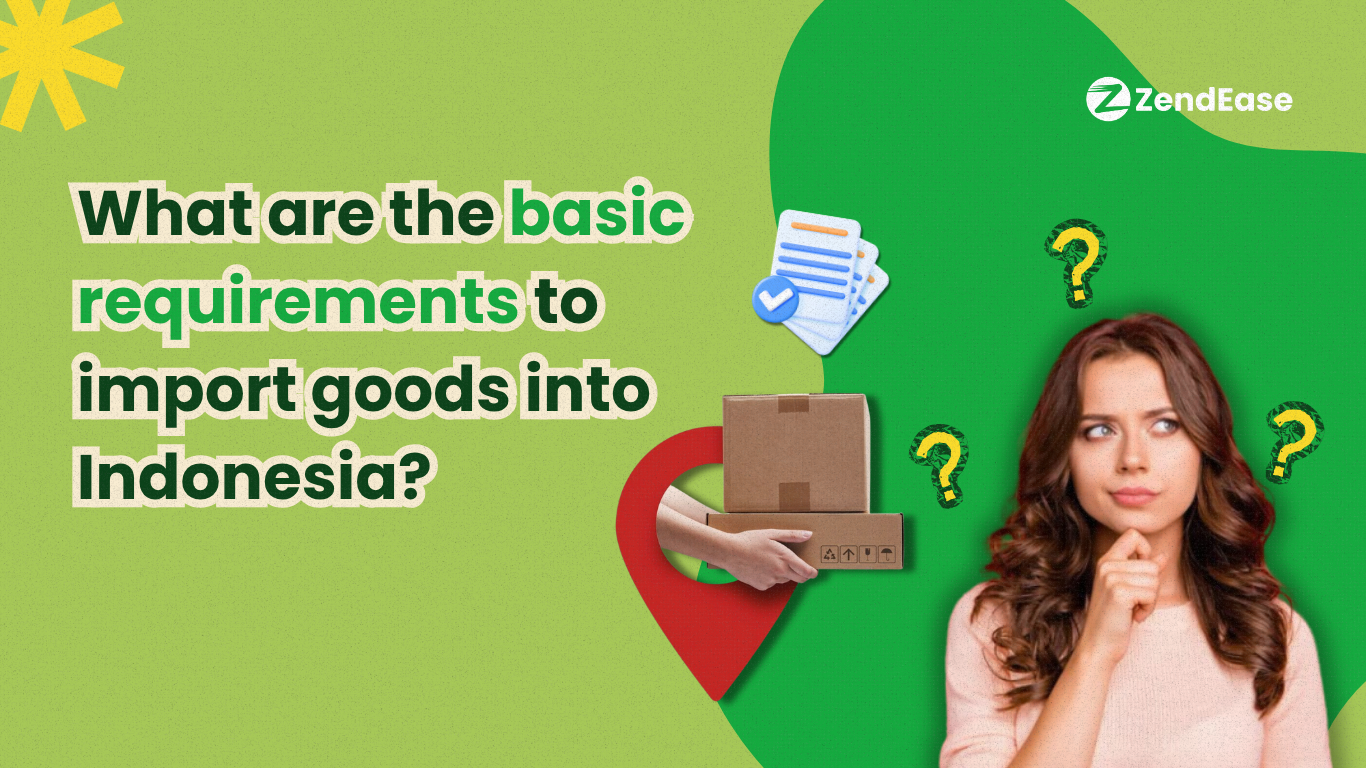What Are the Basic Requirements to Import Goods into Indonesia?
by Muhammad Farhan & Zia Fadhilla on Nov 20, 2025

Entering the world of importing can feel like stepping into a maze — especially if you’re an SME owner or first-time entrepreneur. The opportunity is there: from electronics to organic vegetables, many products aren’t readily available in Indonesian local markets, and bringing them in could be the key to unlocking growth for your business through cross-border shipping to Indonesia.
At ZendEase, we often hear the same concerns from newcomers:
- “I run a small coffee shop, and I want to bring in beans and equipment I can’t find here in Indonesia to elevate my menu. But I’m not sure what paperwork I need.”
- “How long will it take to get everything cleared?”
- “What kind of licenses should I prepare?”
If you’re asking those same questions, you’re in the right place. This article breaks down the basic import requirements for Indonesia customs clearance and is written for first-time importers, SMEs, and entrepreneurs who just want a clear, actionable path.
Start With a Business License (NIB)
To officially import products into Indonesia, your business must be registered and licensed. That starts with obtaining a Business Identification Number (Nomor Induk Berusaha / NIB) through the OSS (Online Single Submission) system.
The NIB acts as:
- Your company’s business license
- Importer identification (formerly known as API-U/API-P)
- Customs access identity (used for PIB submission)
Whether you’re a solo entrepreneur or operating a growing SME, applying for an NIB is the first and most crucial step. Make sure your KBLI code — a classification of business activities — includes import-related activities.
Identify Your Product’s HS Code
Each product you import must be classified under an HS Code (Harmonized System Code). This code determines:
- How much duty and import tax in Indonesia (2025) will you pay
- What restrictions or additional permits apply
- How your goods are categorized at customs
Let’s say you’re importing fresh vegetables. These would fall under HS Chapter 07 and might require quarantine clearance and health certification. Meanwhile, electronic devices fall under a different HS Code and may require post-market approval and SNI (Indonesian National Standard) compliance. Using the wrong HS Code could delay your shipment — or worse, cause rejection at the port.
Check for Product-Specific Restrictions
Not all goods are treated equally. Some product categories require extra documentation or clearance before they can enter the country.
Here are common examples:
- Food and beverages: Often require BPOM approval, halal certification, or a quarantine permit.
- Cosmetics and pharmaceuticals: Must be registered with BPOM before import.
- Electronics: May require post-market approval and compliance with SNI standards.
If you’re importing items like secondhand equipment or refurbished goods, additional restrictions may apply. It’s important to research your product early or consult with a trusted forwarder in Indonesia — like the ZendEase team — to guide you through permits and compliance checks.
Prepare Import Documentation
Once your business is registered and your product is classified, it’s time to prepare the paperwork. Here’s what’s typically required for a standard import shipment:
- Commercial Invoice
- Packing List
- Bill of Lading or Air Waybill
- Certificate of Origin
- Import Declaration (PIB) via the INSW system
- Insurance Certificate (if applicable)
After submission, your declaration will be reviewed. If everything checks out, customs will issue an SPPB (Surat Persetujuan Pengeluaran Barang) — your official approval to release goods from the port. With the right partner in freight forwarding in Indonesia, you can make this process far smoother and ensure your cross-border shipping to Indonesia runs efficiently.
Final Tips for First-Time Importers
Importing doesn’t have to be risky — but it does require attention to detail. Here are a few do’s and don’ts from our team at ZendEase:
Do’s
- Start small to test the process before scaling up.
- Work with a licensed customs broker or service provider to simplify the technical side.
Don’ts
- Don’t skip product research, especially when dealing with food, health, or electronic products.
- Never guess your HS Code — always confirm it with customs or an expert.
- Keep an eye on regulation changes, especially for high-sensitivity goods like cosmetics or refurbished items.
Whether you’re a small business looking to source niche products or a growing company exploring new opportunities, understanding the import requirements of Indonesia is the first step toward a successful import strategy. Partnering with a trusted freight forwarder in Indonesia ensures that every part of your shipping-to-Indonesia journey — from customs to clearance — is handled smoothly.
Need Help?
Need help checking compliance, HS Codes, or licenses? Send your inquiry to indonesia@zendease.com, and our team will walk you through the process step by step to make your cross-border shipping to Indonesia seamless and worry-free.